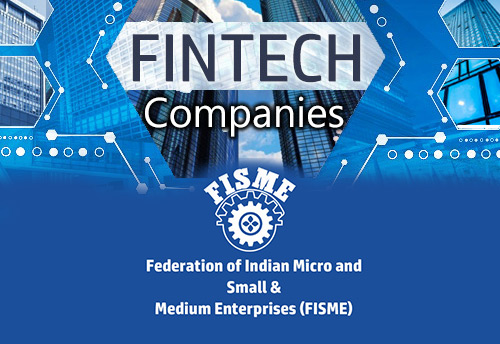FISME submits suggestions to Govt for promotion of Fintech Industry
Updated: May 01, 2018 08:32:33am

FISME submits suggestions to Govt for promotion of Fintech Industry
New Delhi, May 1 (KNN) FISME, the leading federation of MSMEs, recently submitted a set of suggestions to the Government for promotion of Fintech Industry.
This was in response to the invitation by the Steering Committee constituted by the Government to develop a support eco- system for the sector.
Fintech or Financial Technology companies are a recent breed of start-ups who are distinctly separate from other technology companies. Business model of these companies is to provide financial transactions with minimum time lag and costs. Fintech companies are named so as they leverage technology infrastructure of alternative data, cloud computing, mobile internet, vertical search engine services etc.
Worldwide Fintech companies are filling the gap left out by the banks in financing business particularly the MSMEs. Since 2008, banks have been reluctant to lend to SMEs for either of two reasons: their own balance sheets are too fragile, or regulatory restrictions like Basel norms have increased following the crisis.
In India also alternative lending by Fintech companies is a growing space in the country. Players like Lendingkart, FlexiLoans, KredX, Capital Float, Rupeelend, Myloanbuddy and MoneyinMinutes, amongst others are already making their mark in this space.
However, due to their unique business model, Fintech companies are facing quite high gates in the highly conservative financial regulatory environment.
It appears to create a growth space for the Fintech companies in India, the Government has constituted the Steering Committee with both regulators and innovation leaders as members.
The recommendations from FISME include, a single point registration of Fintech companies, providing access to data points, developing an investor protection framework, minimising the tax burden etc.
The area of opportunities the Fintech companies offer may be captured as:
-- i) Promotion of SME lending: MPLs can very well contribute to the SME funding gap.
-- ii) As Channel Partners of Banks / financial Institutions: MPLs may partner with FIs to service small business loans. Because online platforms and systems are more efficient and cost-effective for underwriting small loans, Fintech companies are able to provide a valuable service to FIs in order to expand their market reach.
For example, JPMorgan Chase uses the OnDeck digital platform to service its small business customers. The loans are Chase-branded, held on the FI’s balance sheet, and made using JPMorgan’s underwriting criteria. What was once a process that could take up to one month for approval now is digital and takes on average just one day.
-- iii) Real time appraisals: Fintech companies utilizes automated data and technology platforms to underwrite businesses in as little as minutes based on real-time data.
-- iv) Real time business data: Fintech companies make applicants securely connect third-party channels to provide data such as transactional information, vendor payments, accounting information, social data, online reviews and shipping records, giving a complete, accurate and up-to-the-minute view of the health of the business.
FISME’s suggestions for promotion of this sector are:
-- i. A single registration mechanism for FinTech Companies: The minimum capital base of say Rs.10 cr can be considered. Now Cross Functional Fintech innovations need multiple inputs from multiple regulators – RBI/SEBI/IRDAI.
-- ii. Access to ‘Financial KYC’ database – SEBI and RBI both have their own standards. Fintech companies not allowed to access KYC info from KRAs. Further, eKYC, with prudent checks and balances, could recommence as it would facilitate data sharing with Credit Information Companies and also growth of FinTech Companies.
-- iii. Robust investor protection and securities laws: This is the key focus of regulators because Fintech companies provide investors with direct access to new and potentially riskier forms of investment.
-- iv. Access to bank clearing, settlement and segregation: Reliance on the traditional banking sector for clearing and settlement, combined with strong rules regarding the handling of client money, will strengthen confidence in the burgeoning industry.
-- v. Tax incentives: This will help a great way to reduce the cost of funds for SMEs.
-- vi. Uniform framework for Registration and Closure : There is also a crying need of uniform steps and procedures across all states / UTs to ease formation and closure of innovative ventures / startups (including FinTech Companies). In this connection, amendments in IBC is also required for better coverage and rights to Unsecured Creditors against individual borrowers (such as - representation on committee of creditors without any threshold limit), would help protection against mala fide borrowers and wilful defaulters. (KNN/ DB)











